hellog〜英語史ブログ / 2024-12
01 02 03 04 05 06 07 08 09 10 11 12 13 14 15 16 17 18 19 20 21 22 23 24 25 26 27 28 29 30 31
2026 : 01 02 03 04 05 06 07 08 09 10 11 12
2025 : 01 02 03 04 05 06 07 08 09 10 11 12
2024 : 01 02 03 04 05 06 07 08 09 10 11 12
2023 : 01 02 03 04 05 06 07 08 09 10 11 12
2022 : 01 02 03 04 05 06 07 08 09 10 11 12
2021 : 01 02 03 04 05 06 07 08 09 10 11 12
2020 : 01 02 03 04 05 06 07 08 09 10 11 12
2019 : 01 02 03 04 05 06 07 08 09 10 11 12
2018 : 01 02 03 04 05 06 07 08 09 10 11 12
2017 : 01 02 03 04 05 06 07 08 09 10 11 12
2016 : 01 02 03 04 05 06 07 08 09 10 11 12
2015 : 01 02 03 04 05 06 07 08 09 10 11 12
2014 : 01 02 03 04 05 06 07 08 09 10 11 12
2013 : 01 02 03 04 05 06 07 08 09 10 11 12
2012 : 01 02 03 04 05 06 07 08 09 10 11 12
2011 : 01 02 03 04 05 06 07 08 09 10 11 12
2010 : 01 02 03 04 05 06 07 08 09 10 11 12
2009 : 01 02 03 04 05 06 07 08 09 10 11 12
2024-12-31 Tue
■ #5727. 2024年 heldio 配信でよく聴かれた回ベスト30 [notice][heldio][ranking][link]
今年も日々本ブログおよび姉妹版の Voicy 「英語の語源が身につくラジオ (heldio)」 をご参照いただきました.Voicy より heldio のアナリティクスが取れましたので,今年の一昨日までの全364回について,聴取数によるランキングを作成しました.上位30回まで挙げます(全結果は本記事のソースHTMLをご覧ください).
1. 「#980. 赤ちゃんは無言語状態で育てられても言語を習得できるのか? --- 目白大学の学生から寄せてもらった素朴な疑問」(547回)(2024-02-05配信)
2. 「#1171. 自己紹介 --- 英語史研究者の堀田隆一です」(528回)(2024-08-13配信)
3. 「#1166. なぜ英語ではいつも主語が必要なの? --- 中学生のための英語史」(507回)(2024-08-08配信)
4. 「#945. なぜ言語は変化するのか?」(490回)(2024-01-01配信)
5. 「#1067. 449年,アングロ・サクソンの渡来 --- 『アングロサクソン年代記』の該当テキストより古英語音読」(478回)(2024-05-02配信)
6. 「#1093.「はじめての古英語」生放送(第7弾) with 小河舜さん&まさにゃん --- Bede を読む (4)」(382回)(2024-05-28配信)
7. 「#947. なぜ言語は変化しないのか?」(352回)(2024-01-03配信 )
8. 「#1030. 「はじめての古英語」生放送 with 小河舜さん&まさにゃん --- Bede を読む」(347回)(2024-03-26配信)
9. 「#1124. 「はじめての古英語」第9弾 with 小河舜さん&まさにゃん&村岡宗一郎さん」(331回)(2024-06-27配信)
10. 「#1107. 「はじめての古英語」生放送(第8弾) with 小河舜さん&まさにゃん --- Bede を読む (5)」(325回)(2024-06-11配信)
11. 「#948. なぜ現在分詞形容詞は1語だと名詞の前に置き,2語以上の塊になると名詞の後ろに置くの?」(323回)(2024-01-04配信)
12. 「#1201. 早朝の素朴な疑問「千本ノック」 with 小河舜さん --- 「英語史ライヴ2024」より」(318回)(2024-09-12配信)
13. 「#1054. 年度初めの「英語に関する素朴な疑問 千本ノック」生放送 with 小河舜さん」(317回)(2024-04-19配信)
14. 「#1243. なぜ英語には単数形と複数形の区別があるの? --- 中学生のための英語史」(305回)(2024-10-24配信)
15. 「#1057. 「はじめての古英語」生放送 with 小河舜さん&まさにゃん --- Bede を読む (2)」(300回)(2024-04-22配信)
16. 「#1005. and の意味って考えたことありますか?」(290回)(2024-03-01配信)
17. 「#1172. なぜ have, do の3単現形は has, does と変則的なのですか? --- 中学生のための英語史」(286回)(2024-08-14配信)
18. 「#1087. 英語の料理用語はフランス語とともにあり」(282回)(2024-05-22配信)
19. 「#1033. figure を中心に「ゆる言語学ラジオ」『ターゲット1900』(9) の単語の語源を勝手に補う回」(277回)(2024-03-29配信)
20. 「#1031. 英語は数量を表わすのに属格を好む? --- 前置詞 of を理解するために」(273回)(2024-03-27配信)
21. 「#1066. ノルマン征服 --- Ten Sixty-Six」(273回)(2024-05-01配信)
22. 「#1011. 「変なアルファベット表」の完成と公開 with 寺澤志帆さん」(270回)(2024-03-07配信)
23. 「#1003. There is an apple on the table. --- 主語はどれ?」(269回)(2024-02-28配信)
24. 「#1026. なぜ now と know は発音が違うの?」(259回)(2024-03-22配信)
25. 「#1046. 山口美知代『ハリウッド映画と英語の変化』(開拓社,2024年)」(258回)(2024-04-11配信)
26. 「#991. while の文法化」(257回)(2024-02-16配信)
27. 「#1197. khelf 主催「英語史ライヴ2024」が始まります」(257回 )(2024-09-08配信)
28. 「#990. 文法化とは何か?」(255回)(2024-02-15配信)
29. 「#988. ぎゅうぎゅうの単語とすかすかの単語 --- 内容語と機能語」(253回)(2024-02-13配信)
30. 「#1016. schedule の発音は「スケジュール」か「シェデュール」か? --- 「変なアルファベット表」の S の項目より」(251回)(2024-03-12配信)
1位は,私にとっては(専門外の話題だったので)意外性がありました.上位には「中学生のための英語史」「はじめての古英語」「千本ノック」などのシリーズものが入っています.素朴な疑問系の配信回も堅調です.
対談回としては,25位に「#1046. 山口美知代『ハリウッド映画と英語の変化』(開拓社,2024年)」が入っています.イベント系としては,27位に「#1197. khelf 主催「英語史ライヴ2024」が始まります」が見えます.
上記のランキングのダイジェストは,本日の heldio 「#1311. 2024年 heldio 配信でよく聴かれた回ベスト10」でも配信していますので,どうぞお聴きください.
ランキング上位回で聞き逃しているもの,内容を忘れているものがあれば,ぜひ年末年始のお時間のあるときにまとめ聴きしていただければ.年明けには,2024年第4四半期のリスナー投票も実施したいと思っています.
日々 hellog をお読みくださっている皆様,2024年もお世話になりました.来年も何卒よろしくお願いいたします.
2024-12-30 Mon
■ #5726. brain rot --- 2024年の Oxford 流行語大賞 [woy][oed][thoreau]
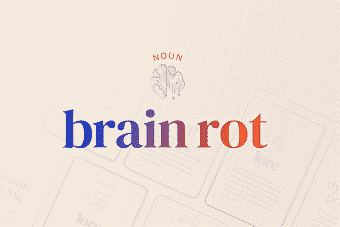
37,000人を超える投票の末,"Oxford Word of the Year 2024" は brain rot に決まりました.Oxford 大学出版によるプレスリリースはこちらです.
brain rot の定義は次の通り.
the supposed deterioration of a person's mental or intellectual state, especially viewed as the result of overconsumption of material (now particularly online content) considered to be trivial or unchallenging. Also: something characterized as likely to lead to such deterioration
かみ砕きつつ解釈を含めて説明すれば「低質のオンラインコンテンツを浴びることによって精神的に病むこと」ほどでしょうか.Oxford の調査によると,主に今年の下半期に著しく使用頻度が高まった語とのことです.若年層のオンライン文化から生まれ,急成長した表現とされています
brain rot の初出は1854年で,Henry David Thoreau (1817--62) の著作 Walden, or Life in the Woods に現われます.その文脈は,"While England endeavours to cure the potato rot, will not any endeavour to cure the brain-rot - which prevails so much more widely and fatally?" です.知的活動の低下を,病原菌により萎縮したジャガイモに見立てた文明批評の一環としての風刺的表現である.
私は本ブログをはじめ様々な媒体で英語史コンテンツを発信していますが,いずれも brain rot の源泉とならないように注意していきたいと思います.
ちなみに昨年2023年の流行語大賞に選ばれたのは rizz でした.これについては「#5342. 切り取り (clipping) による語形成の類型論」 ([2023-12-12-1]) を参照.過去20年の Oxford 大賞受賞語については,こちらの公式ページよりどうぞ.
2024-12-29 Sun
■ #5725. ウェブ月刊誌 Helvillian の1月号が公開されました [helwa][heldio][notice][helmate][helkatsu][helvillian][helville]

昨日12月28日(土)に『月刊 Helvillian 〜ハロー!英語史』の最新号となる第3号(2025年1月)が公開されました.
heldio/helwa のコアリスナーからなる有志ヘルメイトによる制作で,毎月28日に,その月の仲間の皆さんによる様々な英語史活動「hel活」 (helkatsu) を,note 上でリンクを張りつつ紹介していこうという,hel活応援企画です.ぜひこちらの note アカウントをフォローしていただければと思います.
最新号も充実のラインナップです.まずレギュラー連載の種類が多くなりました.さらに note 上で都度公開される記事の執筆者が増え,公開頻度も増してきました.川上さんによる「日曜英語史クイズ」連載も好調です.
そして今号の特集記事は,季節感のある「英語史ゆく年くる年」(←脚韻に注目)です.2024年のhel活の振り返り,および新年に向けての抱負など,ヘルメイトさんの近況が語られています.Grace さんによる表紙のことば,および Helvillian 編集後記も読み逃しなきよう! 表紙やロゴにもこだわりが見られますので,ご注目ください.
先日本ブログでも取り上げた「#5714. 佐久平千本ノック」 ([2024-12-18-1]) は,12月8日のイベントでしたので,今号の Helvillian でも取り上げられています.そもそも今号の表紙を飾っているのは佐久平駅なのです! イベントのホストを務めてくださったコアリスナーのみーさんによる記事「教室だより2024年12月号「堀田隆一教授ご来訪!」」や,ともに参加されたヘルメイト Grace さん の記事「佐久平オフ会(千本ノック)レポ」へもリンクが張られています.
制作班の Grace さん,Lilimi さん,MISATO (Galois) さん,umisio さんには,年末のお忙しい折にお骨折りいただきました.改めて感謝いたします.
過去号については本ブログや「英語の語源が身につくラジオ (heldio)」でご案内しています.そちらもぜひご参照ください.
・ heldio 「#1282. 月刊 Helvillian 第2号が公開されました --- ヘルメイトさんによる自主的なhel活」(2024年10月29日配信)
・ helwa 「【英語史の輪 #204】祝・Helvillian 創刊」(2024年10月29日配信)
・ heldio 「#1248. 月刊誌 Helvillian 創刊! --- helwa リスナー有志によるウェブマガジン」(2024年12月3日配信)
・ hellog 「#5700. ウェブ月刊誌 Helvillian の創刊号・第2号が公開されています」 ([2024-12-04-1])
(以下,後記:2025/01/06(Mon))
2024-12-28 Sat
■ #5724. 英語綴字におけるフランス語の影響 --- 月刊『ふらんす』の連載記事第10弾 [hakusuisha][french][rensai][furansu_rensai][contact][spelling][orthography][diacritical_mark][h][consonant][hypercorrection][heldio]
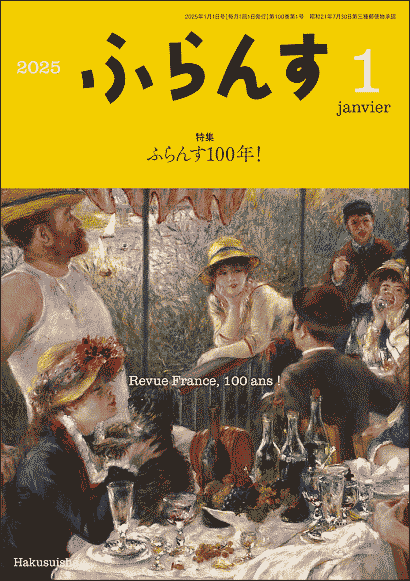
*
12月23日,白水社の月刊誌『ふらんす』2025年1月号が刊行されました.今年度,同誌で連載記事「英語史で眺めるフランス語」を寄稿していますが,今回は第10回「英語綴字におけるフランス語の影響」です.
なんと今号は『ふらんす』の100周年号という記念すべき号でした."Revue France, 100 ans!" と表紙にあり,特集企画「ふらんす100年!」も掲載されています.そのような記念号の一画に,フランス語史ならぬ英語史の連載記事を載せていただくのは恐縮でもあり,喜びでもあります.稀な瞬間に立ち会わせていただき,白水社さんにも感謝いたします.
1. 英語の綴字は意外とフランス語風
ノルマン征服の影響で,その後の英語の綴字にはフランス語の綴字習慣が多分に反映されています.英単語の綴字が実はフランス語的であることはあまり知られていません.
2. 「氷」が īs から ice へ
英語の綴字は,フランス語の影響のもと中英語期にかけて大きく変容しました.「過剰修正」の結果,例えば現代英語の ice にみられるような -ce の綴字が広く採用されました.
3. チャ行子音の綴字が c から ch へ
フランス語の影響により,古英語では c で表記されたチャ行子音が中英語期に ch へと置換されました.これにより英単語 child や church などの綴字が確立しました.
4. 消えた古英語の文字
古英語で常用された文字 (æ, ƿ, þ, ð)は,フランス語に存在しなかったこともあり,中英語以降に衰退していき,最終的には消滅しました.
5. なぜ英語綴字はフランス語かぶれしたのか?
英語綴字は,簡素化や合理化の方向を目指すのではなく,むしろ威信あるフランス語の綴字習慣を受け入れることにより,若干複雑化しました.フランス語は権力と教養と洗練の言語だったのです.
英語の綴字におけるフランス語の影響は,中英語期の綴字変化や古英語文字の廃用に顕著に見られます.これにより古英語的な綴字は影を潜め,代わって現代的な見栄えの綴字が拡がることになりました.
さらに詳しくは,直接『ふらんす』1月号を手に取ってお読みいただければ.過去9回の連載記事は hellog 記事群 furansu_rensai で紹介してきましたので,そちらもご参照ください.
今号と関連して,heldio でも「#1305. 英語綴字におけるフランス語の影響 --- 月刊『ふらんす』の連載記事第10弾」と題してお話ししていますので,こちらもお聴きください.
・ 堀田 隆一 「英語史で眺めるフランス語 第10回 英語綴字におけるフランス語の影響」『ふらんす』2025年1月号,白水社,2024年12月23日.52--53頁.
2024-12-27 Fri
■ #5723. 朝カルシリーズ講座の第9回「英語,ラテン・ギリシア語に憧れる」をマインドマップ化してみました [asacul][latin][greek][mindmap][notice][kdee][etymology][hel_education][lexicology][vocabulary][heldio][link]
12月21日に,今年度の朝日カルチャーセンター新宿教室でのシリーズ講座の第9回が開講されました.今回は「英語,ラテン・ギリシア語に憧れる」と題して,古典語への傾倒が顕著だった16--17世紀の初期近代英語期に注目しました.この時期,知識が増大し学問も発展したために新しい語彙が大量に必要となり,そのニーズに応えるべくラテン語やギリシア語の単語や要素が持ち出されたのでした.結果として,古典語に基づく借用語や新語がおびただしく導入され,英語語彙は空前の拡張を遂げることになります.
今回も,対面およびオンラインで多くの方々にご参加いただきました.ありがとうございます.講座の内容を,markmap というウェブツールによりマインドマップ化して整理してみました(画像としてはこちらからどうぞ).受講された方は復習用に,そうでない方は講座内容を垣間見る機会としてご活用ください.
今回のシリーズ第9回については hellog と heldio の過去回でも取り上げていますので,ご参照ください.
・ hellog 「#5710. 12月21日(土)の朝カルのシリーズ講座第9回「英語,ラテン・ギリシア語に憧れる」のご案内」 ([2024-12-14-1])
・ heldio 「#1297. 12月21日(土)の朝カル講座「英語,ラテン・ギリシア語に憧れる」に向けて」 (2024/12/17)
また,シリーズ過去回のマインドマップについては,以下もご参照ください.
・ 「#5625. 朝カルシリーズ講座の第1回「英語語源辞典を楽しむ」をマインドマップ化してみました」 ([2024-09-20-1])
・ 「#5629. 朝カルシリーズ講座の第2回「英語語彙の歴史を概観する」をマインドマップ化してみました」 ([2024-09-24-1])
・ 「#5631. 朝カルシリーズ講座の第3回「英単語と「グリムの法則」」をマインドマップ化してみました」 ([2024-09-26-1])
・ 「#5639. 朝カルシリーズ講座の第4回「現代の英語に残る古英語の痕跡」をマインドマップ化してみました」 ([2024-10-04-1])
・ 「#5646. 朝カルシリーズ講座の第5回「英語,ラテン語と出会う」をマインドマップ化してみました」 ([2024-10-11-1])
・ 「#5650. 朝カルシリーズ講座の第6回「英語,ヴァイキングの言語と交わる」をマインドマップ化してみました」 ([2024-10-15-1])
・ 「#5669. 朝カルシリーズ講座の第7回「英語,フランス語に侵される」をマインドマップ化してみました」 ([2024-11-03-1])
・ 「#5704. 朝カルシリーズ講座の第8回「英語,オランダ語と交流する」をマインドマップ化してみました」 ([2024-12-08-1])
次回の朝カル講座は.冬のクールの始まりとして,新年の1月25日(土)17:30--19:00に開講予定です.第10回「英語,世界の諸言語と接触する」と題して,主に後期近代英語期以降の世界中の諸言語からの借用語にフォーカスします.ご関心のある方は,朝日カルチャーセンター新宿教室の「語源辞典でたどる英語史」のページよりお申し込みください.
・ 寺澤 芳雄(編集主幹) 『英語語源辞典』新装版 研究社,2024年.
2024-12-26 Thu
■ #5722. Shakespeare は1591--1611年の間にラテン語由来の単語を600語取り込んだ [renaissance][shakespeare][emode][latin][greek][borrowing][loan_word][neologism][statistics][neo-latin][scientific_name][scientific_english][word_formation]
16--17世紀の初期近代英語期は,大部分が英国ルネサンスの最盛期に当たり,古典語(ラテン語とギリシア語)が尊ばれ,そこから大量の単語が英語語彙に取り込まれた時期である.同時代の代表的な文人が Shakespeare なのだが,Durkin によればこの劇作家のみに注目したとしても,短期間に相当数のラテン語由来の新語 ("latinate neologisms") が英語に流入したことが確認されるという.
The peak period of the Literary Renaissance was C.1590--1600. The Primary author was Shakespeare who, between 1591 and 1611, introduced no fewer than six hundred latinate neologisms, fifty-three of which occur in Hamlet alone. Many of these became everyday words, e.g. addiction, assassination, compulsive, domineering, obscene, sanctimonious, traditional. (226--27)
この点で Shakespeare は同時代的に著しい造語力を体現しているといえるが,さらに重要なのは,その後の新古典主義新語ブームに前例を与えたという功績なのではないか.Shakespeare に代表されるルネサンス期に火のついた古典語からの語彙借用の慣習は,続く時代にも勢いが緩まるどころか,むしろ拡張しつつ受け継がれていったからである.Durkin はこう続けている.
After the Renaissance, a vast amount of technical and scientific vocabulary flooded into English from both Greek and Latin, hence words like carnivorous, clitoris, formula, hymen, nucleus. In the next century, Linnaeus [1707--78] introduced numerous biological terms, like chrysanthemums and rhododendron. The Scientific period, which peaked C.1830, featured many Neolatin terms like am(o)eba, bacterium, flagellum. Finally, the modern technical/technological period featured words like floccilation. (227)
これは Shakespeare が英語語彙史上に果たした役割の1つとみてよいだろう.
・ Durkin, Philip. Borrowed Words: A History of Loanwords in English. Oxford: OUP, 2014.
2024-12-25 Wed
■ #5721. 音象徴は語の適者生存を助長する [evolution][sound_symbolism][phonaesthesia][phonetics][vowel]
昨日の記事「#5720. little の i は音象徴か?」 ([2024-12-24-1]) に引き続き,Jespersen による「[i] = 小さい」の音象徴 (sound_symbolism) に関する論考より.
Jespersen は同論文で当該の音象徴を体現する多くの例を挙げているが,冒頭に近い部分で,音象徴の議論にありがちな誤解2点について,注意深く解説している.
In giving lists of words in which the [i] sound has the indicated symbolic value, I must at once ask the reader to beware of two possible misconceptions: first, I do not mean to say that the vowel [i] always implies smallness, or that smallness is everywhere indicated by means of that vowel; no language is consistent in that way, and it suffices to mention the words big and small, or the fact that thick and thin have the same vowel, to show how absurd such an idea would be.
Next, I am not speaking of the origin or etymology of the words enumerated: I do not say that they have from the very first taken their origin from a desire to express small things symbolically. It is true that I believe that some of the words mentioned have arisen in that way,---many of our i-words are astonishingly recent---but for many others it is well-known that the vowel i is only a recent development, the words having had some other vowel in former times. What I maintain, then, is simply that there is some association between sound and sense in these cases, however it may have taken its origin, and however late this connexion may be (exactly as I think that we must recognize secondary echoisms). But I am firmly convinced that the fact that a word meaning little or little thing contains the sound [i], has in many, or in most, cases been strongly influential in gaining popular favour for it; the sound has been an inducement to choose and to prefer that particular word, and to drop out of use other words for the same notion, which were not so favoured. In other words, sound-symbolism makes some words more fit to survive and gives them a considerable strength in their struggle for existence. If you want to use some name of an animal for a small child, you will preferably take one with sound symbolism, like kid or chick . . . , rather than bat or pug or slug, though these may in themselves be smaller than the animal chosen. (285--86)
1つめは「[i] = 小さい」の音象徴は絶対的・必然的なものではなく,あくまで蓋然的なものにすぎない点の確認である.2つめは,当該の音象徴を体現している語について,その音形と意味の関係が語源の当初からあったのか,後に形成されたのかは問わないということだ.合わせて,共時的にも通時的にも,音象徴の示す関係は緩い傾向にとどまり,何かを決定する強い力をもっているわけではない点が重要である.
それでも Jespersen は,引用の最後でその用語を使わずに力説している通り,音象徴には語の「適者生存」 (survival of the fittest) を助長する効果があると確信している.音象徴は,言語において微弱ながらも常に作用している力とみなすことができるだろうと.
・ Jespersen, O. "Symbolic Value of the Vowel I." Philologica 1 (1922). Reprinted in Linguistica: Selected Papers in English, French and German. Copenhagen: Levin & Munksgaard, 1933. 283--303.
2024-12-24 Tue
■ #5720. little の i は音象徴か? [sound_symbolism][phonaesthesia][phonetics][hellog_entry_set][link][sound_change][vowel]
音象徴 (sound_symbolism) は,言語学では伝統的に周辺的な扱いを受けてきた.この件については「#1269. 言語学における音象徴の位置づけ」 ([2012-10-17-1]) をはじめとする一連の記事で取り上げてきた.
そのような中で,Jespersen は異色である.1922年の論文で,英語やその他の言語における [i] の音象徴について熱っぽく論じているのだ.論文の冒頭から熱い.
Sound symbolism plays a greater role in the development of languages than is admitted by most linguists. In this paper I shall attempt to show that the vowel [i], high-front-unround, especially in its narrow or thin form, serves very often to indicate what is small, slight, insignificant, or weak. (283)
[i] が「小さい」と結びつけられる音象徴は広く知られており,本ブログでも「#242. phonaesthesia と 遠近大小」 ([2009-12-25-1]) で触れた.Jespersen は,この論文のなかで,多くの例を挙げながら [i] の「小ささ」についてグイグイと議論していく.
特におもしろいのは, little という,この話題との関連で真っ先に思い浮かぶ英単語についての論考である."Semantic and Phonetic Changes" と題する第7節で,次のように述べている.
The influence on sound development is first seen in the very word little. OE. lytel shows with its y, that the vowel must originally have been u, and this is found in OSax. luttil, OHG. luzzil; cf. Serb. lud 'little' and OIr. lútu 'little finger' (Falk and Torp); but then the vowel in Goth. leitils (i.e. lītils and ON. lítinn is so difficult to account for on ordinary principles that the NED. in despair thinks that the two words are "radically unconnected". I think we have here an effect of sound symbolism. The transition in E. from y to it of course is regular, being found in innumerable words in which sound symbolism cannot have played any role, but in modern English we have a further slight modification of the sound which tends to make the word more expressive, I refer to the form represented in spelling as "leetle". In Gill's Logonomia (1621, Jiriczek's reprint 48), where he mentions the "particle" tjni (j is his sign for the diphthong in sign) he writes "a lïtle tjni man" with ï (his sign for the vowel in seen), though elsewhere he writes litle with short i. NED. under leetle calls it "a jocular imitation of a hesitating (?) or deliberately emphatic pronunciation of little". Payne mentions from Alabama leetle "with special and prolonged emphasis on the î sound to indicate a very small amount". I suspect that what takes place is just as often a narrowing or thinning of the vowel sound as a real lengthening, just as in Dan. bitte with narrow or thin [i], see above. To the quotations in NED. I add the following: Dickens Mutual Fr. 861 "a leetle spoilt", Wells Tono-B. 1. 92 "some leetle thing", id. War and Fut. 186 "the little aeroplane ... such a leetle thing up there in the night".---It is noteworthy that in the word for the opposite notion, where we should according to the usual sound laws expect the vowel [i] (OE. micel, Sc. mickle, Goth. mikils) we have instead u: much, but this development is not without parallels, see Mod. E. Gr. I. 3. 42. In Dan. dial, mög(el) for the same word the abnormal vowel is generally ascribed to the influence of the labial m; in both forms the movement away from i may have been furthered by sound-symbolic feeling. (301--02)
「[i] = 小さい」という音象徴について,little の母音はポジティヴに,対義語 much の母音はネガティヴに反応し音変化を経てきた,という鋭い洞察だ.もともとの語源形との関連で音象徴を論じるのみならず,音変化の動機づけとしての音象徴を考察していくこともまた重要なのではないかと気付かされた.
・ Jespersen, O. "Symbolic Value of the Vowel I." Philologica 1 (1922). Reprinted in Linguistica: Selected Papers in English, French and German. Copenhagen: Levin & Munksgaard, 1933. 283--303.
2024-12-23 Mon
■ #5719. ギリシア語が英語に影響を与えた3つの型 [greek][latin][borrowing][loan_word][lexicology][word_formation][derivation][compounding][oe][prestige][combining_form][morphology][scientific_name][scientific_english][link]
ギリシア語が英語に与えた語彙的影響は,ラテン語やフランス語のそれに比べると見劣りするように思われるかもしれないが,実際にはきわめて大きい.語彙そのものというより,むしろ語形成 (word_formation) に与えた影響が大きい,といったほうが適切かもしれない.とりわけ連結形 (combining_form) を用いた科学系の複合語の形成は,ギリシア語の偉大な貢献である.
Durkin (231) は,英語史におけるギリシア語の影響について,広い視野から次のように述べている.
Between C5 and C8-9, the Greek liberal arts education was revived, first by the Ostrogoths, later by the Carolingians, and Greek gained special prestige. Writers liberally sprinkled their woks with Greek words, many of which found their way into other languages of Europe, including Old English. Particularly noteworthy are the glossarial poems from Canterbury with words like apoplexis, liturgia, spasmus. Since then, Greek medical doctrine and the terms associated with it became the major part of English medical lexis . . . . More general scientific vocabulary from Greek has mushroomed since C18 . . . .
. . . .
Greek influence on English, then, is restricted to the lexicon, (limited) derivation, and compounding. Words entered English initially through Roman borrowings, then through direct borrowing from Ancient Greek writers, more recently through word formation (combining roots and affixes) in English.
ギリシア語の英語への影響には,3パターンあるいは3段階があったとまとめてよいだろう.
(1) ラテン語を経由して(中世から)
(2) 直接ギリシア語から(近代以降)
(3) ギリシア語「要素」を用いた英語内での造語(近代以降,特に18世紀以降;「科学用語新古典主義的複合語」 (neo-classical compounds) あるいは「英製希語」と呼んでもよいか)
いずれのパターンについても,ギリシア語に付された威信 (prestige) を反映して学術用語の造語が圧倒的である.関連する話題として,以下の hellog 記事も参照.
・ 「#516. 直接のギリシア語借用は15世紀から」 ([2010-09-25-1])
・ 「#552. combining form」 ([2010-10-31-1])
・ 「#616. 近代英語期の科学語彙の爆発」 ([2011-01-03-1])
・ 「#617. 近代英語期以前の専門5分野の語彙の通時分布」 ([2011-01-04-1])
・ 「#1694. 科学語彙においてギリシア語要素が繁栄した理由」 ([2013-12-16-1])
・ 「#3014. 英語史におけるギリシア語の真の存在感は19世紀から」 ([2017-07-28-1])
・ 「#3013. 19世紀に非難された新古典主義的複合語」 ([2017-07-27-1])
・ 「#3166. 英製希羅語としての科学用語」 ([2017-12-27-1])
・ 「#3179. 「新古典主義的複合語」か「英製羅語」か」 ([2018-01-09-1])
・ 「#3368. 「ラテン語系」語彙借用の時代と経路」 ([2018-07-17-1])
・ 「#4191. 科学用語の意味の諸言語への伝播について」 ([2020-10-17-1])
・ 「#4449. ギリシア語の英語語形成へのインパクト」 ([2021-07-02-1])
・ 「#5718. ギリシア語由来の主な接尾辞,接頭辞,連結形」 ([2024-12-22-1])
・ Durkin, Philip. Borrowed Words: A History of Loanwords in English. Oxford: OUP, 2014.
2024-12-22 Sun
■ #5718. ギリシア語由来の主な接尾辞,接頭辞,連結形 [greek][suffix][prefix][lexicology][word_formation][combining_form][morphology][latin][french][loan_word][borrowing]
Durkin (216--19) にかけて,英語に入ったギリシア語由来の要素が列挙されている.接尾辞 (suffix),接頭辞 (prefix),連結形 (combining_form) に分けて,主たるものを列挙しよう.ラテン語やフランス語からの借用語のなかに混じっている要素もあり,究極的にはギリシア語由来であることが気づかれていないものも含まれているのではないか.
[ 接尾辞 ]
-on (plural -a), -ter, -terion, -ma/-mat- (adj. -matic), the family of -ize/-ise (-ist/-ast, -ism, -asm), -ite, -ess, -oid, -isk, -(t)ic, -istic(al), -astic(al)
[ 接頭辞 ]
a(n)-, amph(i)-, an(a)-, anti-, ap(o)-, cat(a)-/kat(a)-, di(a)-, dys-, a(n)-, end(o)-, exo-, ep(i)-, hyper-, hyp(o)-, met(a)-, par(a)-, peri-, pro-, pros-, syn-/sys-
[ 連結形 ]
acro- "high; of the extremities", agath(o)- "good", all(o)- "other, alternate, distinct", arch- "chief; original", argyr(o)- "silver", aut(o)- "self(-induced); spontaneous", bary-/bar(o)- "heavy; low; internal", brachy- "short", brady- "slow", cac(o)- "bad", chlor(o)- "green; chlorine", chrys(o)- "gold; golden-yellow", cry(o)- "freezing; low-temperature", crypt(o)- "secret; concealed", cyan(o)- "blue", dipl(o)- "twofold, double", dolich(o)- "long", erythr(o)- "red", eu- "good, well", glauc(o)- "bluish-green, grey", gluc(o)- "glucose"/glyc(o)- "sugar; glycerol"/glycy- "sweet", gymn(o)- "naked, bare", heter(o)- "other, different", hol(o)- "whole, entire", homeo- "similar; equal", hom(o)- "same", leuc/k(o)- "white", macro- "(abnormally) large", mega- "huge; very large", megal(o)- "large; grandiose" and -megaly "abnormal enlargement", melan(o)- "black; dark-colored; pigmented", mes(o)- "middle", micr(o)- "(very) small", nano- "one thousand-millionth; extremely small", necr(o)- "dead; death", ne(o)- "new; modified; follower", olig(o)- "few; diminished; retardation", orth(o)- "upright; straight; correct", oxy- "sharp, pointed; keen", pachy- "thick", pan(to)- "all", picr(o)- "bitter", platy- "broad, flat", poikil(o)- "variegated; variable", poly- "much, many", proto- "first", pseud(o)- "false", scler(o)- "hard", soph(o)- and -sophy "skilled; wise", tachy- "swift", tel(e)- "(operating) at a distance", tele(o)- "complete; completely developed", therm(o)- "warm, hot", trachy- "rough"
英語ボキャビルのおともにどうぞ.
・ Durkin, Philip. Borrowed Words: A History of Loanwords in English. Oxford: OUP, 2014.
2024-12-21 Sat
■ #5717. 高橋真理子先生との2回の heldio 対談 --- 『World Englishes 入門』の第8章「ヨーロッパと中東の英語」 [voicy][heldio][notice][world_englishes][we_nyumon][european_english][review][lingua_franca]
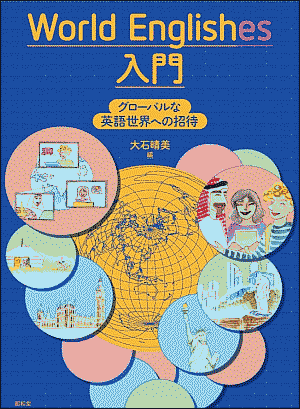
先日,高橋真理子先生(関西学院大学)と Voicy heldio で2度にわたり対談させていただきました.昨年昭和堂より出版されている『World Englishes 入門』より,高橋先生の執筆された第8章「ヨーロッパと中東の英語」について,著者じきじきにお話をうかがうという回でした.
・ 「#1294. 著者と語る『World Englishes 入門』(昭和堂,2023年) --- 高橋真理子先生とのヨーロッパと中東の英語をめぐる対談」(2024年12月14日配信)
・ 「#1300. 高橋真理子先生とのアフタートーク --- 『World Englishes 入門』(昭和堂,2023年)の第8章「ヨーロッパと中東の英語」をめぐって」(2024年12月20日配信)
今回は,知っているようで意外と知らないヨーロッパと中東の英語事情について,本書第8章の記述を土台にしつつ,高橋先生にご解説いただきました.この広い地域には多様な言語,文化,民族が分布しています.そのなかで英語がいかにリンガフランカ (lingua_franca) として機能しているのか,社会的にどのように位置づけられているのか,いかなる英語変種が用いられているのか.様々な疑問が生じます.さらに,なぜヨーロッパと中東が,同じ章で扱われているのでしょうか.アフタートークを含め,今回の対談では,このような質問にお答えいただきました.
ぜひ,これまでの『World Englishes 入門』関連の hellog 記事や heldio 対談回へ,we_nyumon を通じてアクセスしていただければと思います.
最後に,アフタートークでも触れましたが,高橋先生の最近のご単著にもご注目ください.『アジア英語における口語表現の比較』(ナカニシヤ出版,2023年)です.高橋先生,このたびは対談のお時間を割いていただきまして,ありがとうございました!
・ 大石 晴美(編) 『World Englishes 入門』 昭和堂,2023年.
・ 高橋 真理子 『アジア英語における口語表現の比較』 ナカニシヤ出版,2023年.
2024-12-20 Fri
■ #5716. 保坂先生との heldio 対談シリーズ --- 冠詞と do の文法化について [voicy][heldio][grammaticalisation][article][do-periphrasis][review][notice]
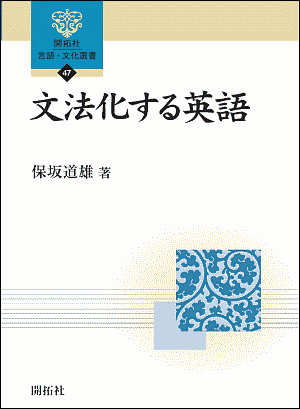
先日,保坂道雄先生(日本大学)と Voicy heldio にて文法化にまつわる対談を2回にわたってお届けしました.開拓社より2014年に出版されたご著書『文法化する英語』を参照しながら,英語史における文法化の具体的な事例について,著者じきじきに解説していただくという贅沢な企画です.2回の配信を以下に挙げておきます.
・ 「#1290. 冠詞の文法化 --- 保坂先生との対談」(2024年12月10日配信)
・ 「#1293. 助動詞 do の文法化 --- 保坂先生との対談」(2024年12月13日配信)
英語史上,きわめて重要な文法化の2つの事例,冠詞の創発と do 迂言法の発展について丁寧に解説していただきました.これらの問題に関心をもった方は,本ブログより article や do-periphrasis のタグの付された記事群を読んでいただければと思います.
上記配信内でも触れていますが,保坂先生との文法化をめぐる heldio 対談回は,以前にも1度配信しています.本ブログより「#5674. 保坂道雄先生との対談 --- ご著書『文法化する英語』(開拓社,2014年)より」 ([2024-11-08-1]) を,あるいは直接 heldio 「#1245. 保坂道雄先生との「文法化入門」対談 --- 「英語史ライヴ2024」より」をご参照ください.
おまけとして,今回の保坂先生との対談にあたって「#1298. 保坂先生とのアフタートークでコメント返し」(2024年12月18日配信)も収録しています.こちらは肩の凝らないおしゃべり回ですので,ぜひお聴きいただければ.
・ 保坂 道雄 『文法化する英語』 開拓社,2014年.
2024-12-19 Thu
■ #5715. 現代に借用されたフランス語の単語 [french][loan_word][borrowing][lexicology]
英語にとって,フランス語は歴史的に「腐れ縁」の仲である.古英語末期より現代に至るまで,言語的な付き合いが途切れたことはない.時代によって浮き沈みはあるものの,フランス語の単語は常に英語に流入し続けてきたし,フランス語は英語にとって心理的距離が最も近い言語といってよいだろう.
中英語期や近代英語期ほどではないが,現代でもフランス単語は着実に英語に流入してきている.OED で検索すると,20世紀以降のフランス借用語は,ざっと1000語ほどある.そのなかでも比較的頻度の高いものを50個ほど挙げてみよう.
micelle (1901), garage (1902), reductase (1902), limousine (1902), austenite (1902), bloc (1903), metro (1904), fuselage (1909), camp (1909), sabotage (1910), ciel (1910), Cubism (1911), Chardonnay (1911), mas (1912), matière (1915), surrealist (1918), collage (1919), adage (1920), bacteriophage (1921), saboteur (1921), hydrolase (1922), bistro (1922), nematic (1923), lipid (1925), exclusivity (1926), infrastructure (1927), surrealism (1927), moderne (1928), montage (1930), anomie (1933), evacuee (1934), Gaullist (1941), microfiche (1950), Annales (1952), chlorpromazine (1952), nouveau (1955), neuroleptic (1958), virion (1959), operon (1960), eukaryote (1961), auteur (1962), non (1963), prokaryote (1963), Art Deco (1966), retro (1972), intertextuality (1973), fractal (1975), endorphin (1976), Prolog (1977), acquis (1979)
この一覧には,日本語に入っている語も多い.ガレージ,リムジン,ブロック,メトロ,サボタージュ,キュービズム,シャルドネ,ビストロ,シュールレアリスム,モンタージュ,マイクロフィッシュ,アールデコ,レトロ,フラクタル,エンドルフィンなど,20世紀中に,英語語彙のみならず日本語語彙にも貢献してきたフランス単語を評価したい.
ちなみに21世紀になってから(2002年に)英語に借用された parkour (パルクール)というフランス単語にも注目しておこう.環境内の障害物を越えていく軍事訓練から発達した競技で、現在世界中で人気急上昇のスポーツである.
2024-12-18 Wed
■ #5714. 佐久平千本ノック [helkatsu][senbonknock][sobokunagimon][voicy][heldio][helwa][helmate][hel_education]
12月8日,長野県佐久平にて英語に関する素朴な疑問に回答する「千本ノック」 (senbonknock) の企画を開催しました.heldio/helwa のコアリスナーであるみーさんがホストを務めてくださり,初の地方開催での千本ノック,かつ質問者が小中学生である千本ノックが実現した次第です.15名の小中学生,およびその保護者の方々が会場に集まり,生徒さんたちに事前に考えておいてもらった16の質問を題材に,私が80分ほどお話しさせていただきました.同席されたもう1人のコアリスナー Grace さんが,後日,同イベントへの潜入ルポというべき note 記事「佐久平オフ会(千本ノック)レポ」を書かれています.
小中学生から寄せられた疑問をもとに,ぶっつけ本番で千本ノックを敢行しました.大人相手とは異なり質問の角度も鋭角ですし,回答するにも専門用語は使えず,あくまで平易な言葉で分かりやすく答えなければなりません.事前に予想はしていたものの,私にとっては予想以上に難易度の高い課題でした.しかし,非常に多くの気づきを得られたことも確かです.教育上のみならず学術的にも示唆に富んだ質問がいくつかあり,当たり前に思っていた現象を再考察する機会となりました.
今回の佐久平千本ノックの一部始終は,当日の Voicy heldio で生配信しました.後日,それを前半(小学生版)と後半(中学生版)の2回に分割して,アーカイヴとしても配信しました.収録時の問題で,ところどころ聞こえにくいところはありますが,ご容赦ください.以下に,聴取の便のため,寄せられた質問と本編チャプター内の対応する分秒を一覧します.
【前半:小学生部門(約60分) 「#1289. 佐久平千本ノック (1) --- 小中学生の皆からの素朴な疑問」】
(1) 03:12 --- なぜ1のワンは one と書くの?
(2) 08:16 --- なぜ筆記体ができたの?
(3) 12:17 --- なぜ大文字と小文字で違う形の文字があるの?
(4) 18:31 --- アルファベットの形はどんな理由で決まったの?
(5) 22:13 --- なぜ deer, sheep, fish の複数形には -s がつかないの?
(6) 27:40 --- なぜ c と k で同じ発音をするの?
(7) 32:04 --- なぜ bottle の発音は t を読まないの?
(8) 36:38 --- なぜ c は「ク」とか「キャ」と読むのですか?
(9) 41:35 --- なぜ knife の k は読まないのですか?
(10) 45:10 --- なぜ英語が世界共通語なのですか?
【後半:中学生部門(約48分) 「#1292. 佐久平千本ノック (2) --- 小中学生の皆からの素朴な疑問」】
(11) 00:55 --- be 動詞が主語に応じて is, am, are と形を変えるのはなぜですか?
(12) 08:40 --- 序数の形について,なぜ first, second, fifth は変な形なのですか?
(13) 15:32 --- 疑問文で does が出ると動詞の -s がなくなるのはなぜですか?
(14) 22:19 --- 英語やアルファベットは誰が作ったのですか?
(15) 27:14 --- なぜ接続詞の that は省略できるの?
(16) 33:12 --- なぜ be 動詞と一般動詞は一緒に使えないのですか?
佐久平千本ノックに参加した小中学生と保護者の皆さん,本当に大きなインスピレーションをいただきました.あらためて感謝申し上げます.
2024-12-17 Tue
■ #5713. 生成文法と言語変化・英語史を掛け合わせた著書が出ました --- 田中 智之・縄田 裕幸・柳 朋宏(著)『生成文法と言語変化』(開拓社,2024年) [generative_grammar][language_change][grammaticalisation][syntax][review][toc][notice]
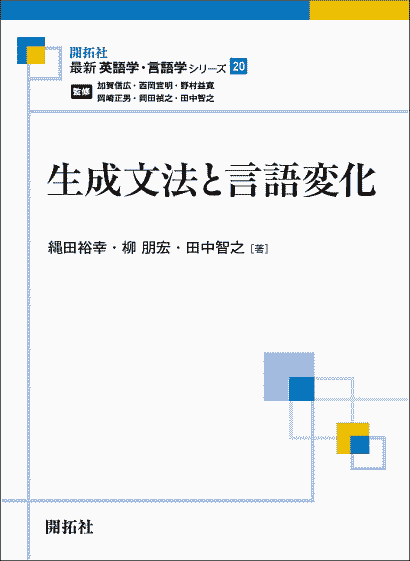
標記の開拓社からの新刊書をご献本いただきました,ありがとうございます!
開拓社による「最新英語学・言語学シリーズ」の第20巻という位置づけで,「生成文法×英語史」の最新の専門的な知見がまとめられています.300頁ほどの著書で,量的にも本格派です.英語の統語変化を理論的に考察したい研究者・学生にとって,必携の参考書です.
以下,目次を取り出してみましょう.魅力的な話題と高度な専門用語が並んでいます.
第I部 生成文法理論における言語変化
第1章 生成文法の理論的枠組みと言語変化
1. はじめに:英語史の時代区分
2. 生成文法の理論的枠組み
3. 文法変化としての言語変化
第2章 言語変化のタイプ
1. 再分析とパラメター変化
2. 文法化:不定詞標識 to を例として
3. 語順変化
4. 項構造の変化:心理動詞を例として
第II部 英語の節構造の変化
第3章 初期英語の節構造と動詞移動の消失
1. はじめに
2. 古英語・初期中英語の基本語順
3. 古英語・初期中英語の節構造
4. 動詞移動と豊かな一致の仮説
5. 屈折接辞の衰退と動詞移動の消失
6. 文法化による語彙動詞から助動詞への変化
7. まとめ
第4章 主語位置の変遷と各種構文の変化
1. はじめに
2. 空主語構文
3. 奇態格経験者主語構文
4. 他動詞虚辞構文
5. that 痕跡効果
6. まとめ
第III部 英語名詞句の構造と分布
第5章 非構造格の消失と格による名詞句の認可方法の変化
1. はじめに
2. 格に関する経験的事実と理論的仮定
3. 与格名詞をともなう構文の歴史的変遷
4. 与格名詞の認可と認可方法の変化
5. まとめ
第6章 数量詞の分布と遊離可能性の通時的変遷
1. はじめに
2. 初期英語における数量詞の分布
3. 理論的仮定
4. 遊離数量詞の分布に関する通時的変化
5. 代名詞と数量詞の語順
6. まとめ
本書については,12月11日に Voicy heldio にて「#1291. 田中 智之・縄田 裕幸・柳 朋宏(著)『生成文法と言語変化』(開拓社,2024年)」の配信回でもご紹介しています.本記事と合わせてお聴きいただければ.
本書と関連して,開拓社の「最新英語学・言語学シリーズ」の第21巻,家入 葉子・堀田 隆一(著)『文献学と英語史研究』(開拓社,2022年)もどうぞよろしくお願い致します.
・ 田中 智之・縄田 裕幸・柳 朋宏 『生成文法と言語変化』 開拓社,2024年.
2024-12-16 Mon
■ #5712. Norman の複数形に Normans のほか Normen もあった [number][plural][compound][metanalysis][analogy][folk_etymology][oed]
German (ドイツ人)の複数形は Germans であり *Germen にはならない.語源的に -man 複合語ではないからだ.同様に human (人間), Ottoman (オスマン・トルコ人), talisman (護符)なども,-man はあくまで語幹の一部であり,語源的に -man 複合語ではないために,複数形は規則的に - s をつけて humans, Ottomans, talismans とする.*humen, *Ottomen, *talismen とはならない.
これと若干事情が異なるのが「#707. dragoman」 ([2011-04-04-1]) で紹介した名詞の複数形である.dragoman (通訳)は語源的には -man 複合語ではないものの,複数形としては dragomans のみならず dragomen も用いられる.後者は一種の勘違い,あるいは異分析 (metanalysis) に基づく語形だが,歴史的には許容されてきた.
さらに異なるタイプが,今回取り上げる Norman の複数形だ.この名詞は,語源的には north + -man であり,明らかに -man 複合語である(cf. 「#1568. Norman, Normandy, Norse」 ([2013-08-12-1])).したがって,複数形は *Normen となることが予想されるが,実際には全体として1つの名詞語幹として解釈されるようになったのだろう,Normans という語形が通用されてきた.
ところが Norman の語史をひもとくと,かつては複数形として Normen も用いられていたことがわかる.OED より古英語からの最初期の例文を挙げてみよう.
OE Þær wæs Harold cyning of Norwegan & Tostig eorl ofslagen, & gerim folces mid heom, ægðer ge Normana ge Englisca, & þa Normen [flugon þa Englis[c]a].
Anglo-Saxon Chronicle (Tiberius MS. B.i) anno 1066
OE Harold for to Norwegum, Magnus fædera, syððan Magnus dead wæs, & Normen hine underfengon.
Anglo-Saxon Chronicle (Tiberius MS. B.iv) anno 1049
一方,古くから Normans のほうが普通の複数形だったようではある.
c1275 (?a1200) Seoððen comen Normans [c1300 Otho MS. Normains]..and nemneden heo Lundres.
Laȝamon, Brut (Caligula MS.) (1963) 7115
c1325 (c1300) þus was in normannes hond þat lond ibroȝt.
Chronicle of Robert of Gloucester (Caligula MS.) 7498
-man 語の民間語源的な複数形をめぐる事例は,ほかにもあるかもしれない.
2024-12-15 Sun
■ #5711. 構成素の順序についての相関関係 --- 統語に関する類型論の基本的なアイディア [typology][syntax][word_order][history_of_linguistics]
統語に関する類型論 (typology) の古典的な知見を紹介する.Whaley (86) が Lehmann (1973, 1978a) を参照しながら "Lehmann's Consituent Order Correlations" を掲げている.
| Word Order | Correlation |
| VO | OV |
| Preposition + noun | Noun + preposition |
| Noun + genitive | Genitive + noun |
| Noun + adjective | Adjective + noun |
| Noun + relative clause | Relative clause + noun |
| Sentence-initial question word | Noninitial question word |
| Prefixes | Suffixes |
| Auxiliary verb + main verb | Main verb + auxiliary verb |
| Comparative adjective + standard | Standard + comparative adjective |
| Verb + adverb | Adverb + verb |
| Negative + verb | Verb + negative |
| Subordinator + clause | Clause + subordinator |
ある言語が VO 語順か OV 語順かが分かれば,その他の統語項目の並び順も予想できる,というのがこの表の骨子である.もちろん必ずしも正確に予想できるわけではないのだが,少なくとも相関関係はある,というのが趣旨だ.
しかし,この相関関係の主張に対しては様々な批判が投げかけられてきた.1つは,それほど高い相関関係ではないのではないかという疑いだ.例えば,英語は VO 語順だが,予想される「名詞+形容詞」ではなく「形容詞+名詞」が基本だ.このような「反例」が思ったよりも多く出てきてしまうようだ.
いま1つは,この表を受け入れるにせよ,なぜこのような相関関係が成立するのかについての考察がなされていないことだ.
さらに,VO か OV かという違いを基盤に据えれば他の統語項目の並び順を予想することができるという主張がなされているわけだが,真に相関関係が成り立つのであれば,基盤に据えるのは他の統語項目でもよいはずだ.なぜ VO か OV をとりわけ重要な基盤とみなすのだろうか.
このような反論はあるものの,Lehmann は統語に関する類型論の基本的なアイディアを示してくれたとはいえる.
今回参照した Whaley の著書については「#4692. 類型論の3つの問題,および類型論と言語変化の関係について」 ([2022-03-02-1]) も参照.
・ Whaley, Lindsay J. Introduction to Typology: The Unity and Diversity of Language. Thousand Oaks: Sage, 1997.
・ Lehmann, Winfred P. "A Structural Principle of Language and Its Implications." Language 49 (1973): 47--66.
・ Lehmann, Winfred P. "Conclusion: Toward an Understanding of the Profound Unity Underlying Language." Syntactic Typology. Austin: U of Texas P, 1978. 395--432.
[ 固定リンク | 印刷用ページ ]
2024-12-14 Sat
■ #5710. 12月21日(土)の朝カルのシリーズ講座第9回「英語,ラテン・ギリシア語に憧れる」のご案内 [asacul][notice][kdee][etymology][hel_education][helkatsu][link][lexicology][vocabulary][latin][greek][renaissance][emode][voicy][heldio]
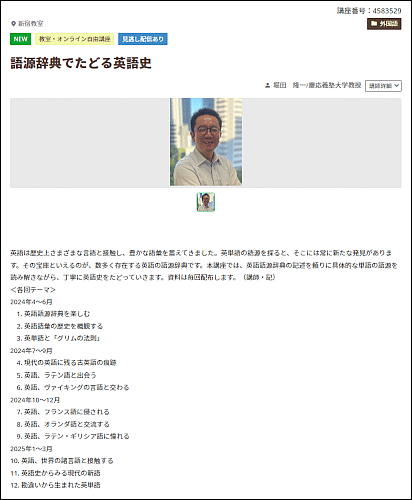
・ 日時:12月21日(土) 17:30--19:00
・ 場所:朝日カルチャーセンター新宿教室
・ 形式:対面・オンラインのハイブリッド形式(1週間の見逃し配信あり)
・ お申し込み:朝日カルチャーセンターウェブサイトより
今年度の朝カルシリーズ講座「語源辞典でたどる英語史」が,月に一度のペースで順調に進んでいます.主に『英語語源辞典』(研究社)を参照しながら,英語語彙史をたどっていくシリーズです.
1週間後に開講される第9回では主に初期近代英語期におけるラテン語およびギリシア語の語彙的影響を評価します.16--17世紀の初期近代英語期は英国ルネサンスの時代に当たり,古典語への傾倒が顕著でした.知識が増大し学問も発展したために新しい語彙が大量に必要となり,そのニーズに応えるべくラテン語やギリシア語の単語や要素が持ち出されたのです.結果として,古典語に基づく借用語や新語がおびただしく導入され,英語語彙は空前の拡張を遂げることになります.
今回の講座では,古典語からの借用語に主に注目し,この時期の語彙拡大の悲喜劇を観察してみたいと思います.ぜひ皆さんもこの時代にもたらされたラテン・ギリシア語系のオモシロ単語を探してみてください.
本シリーズ講座の各回は独立していますので,過去回への参加・不参加にかかわらず,今回からご参加いただくこともできます.過去8回分については,各々概要をマインドマップにまとめていますので,以下の記事をご覧ください.
・ 「#5625. 朝カルシリーズ講座の第1回「英語語源辞典を楽しむ」をマインドマップ化してみました」 ([2024-09-20-1])
・ 「#5629. 朝カルシリーズ講座の第2回「英語語彙の歴史を概観する」をマインドマップ化してみました」 ([2024-09-24-1])
・ 「#5631. 朝カルシリーズ講座の第3回「英単語と「グリムの法則」」をマインドマップ化してみました」 ([2024-09-26-1])
・ 「#5639. 朝カルシリーズ講座の第4回「現代の英語に残る古英語の痕跡」をマインドマップ化してみました」 ([2024-10-04-1])
・ 「#5646. 朝カルシリーズ講座の第5回「英語,ラテン語と出会う」をマインドマップ化してみました」 ([2024-10-11-1])
・ 「#5650. 朝カルシリーズ講座の第6回「英語,ヴァイキングの言語と交わる」をマインドマップ化してみました」 ([2024-10-15-1])
・ 「#5669. 朝カルシリーズ講座の第7回「英語,フランス語に侵される」をマインドマップ化してみました」 ([2024-11-03-1])
・ 「#5704. 朝カルシリーズ講座の第8回「英語,オランダ語と交流する」をマインドマップ化してみました」 ([2024-12-08-1])
本講座の詳細とお申し込みはこちらよりどうぞ.『英語語源辞典』(研究社)をお持ちの方は,ぜひ傍らに置きつつ受講いただければと存じます(関連資料を配付しますので,辞典がなくとも受講には問題ありません).
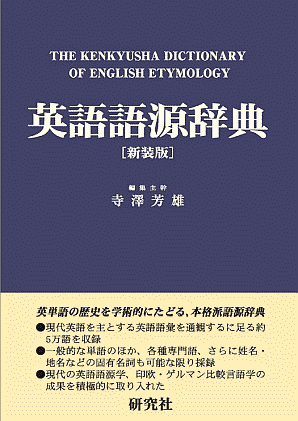
(以下,後記:2024/12/17(Tue))
・ 寺澤 芳雄(編集主幹) 『英語語源辞典』新装版 研究社,2024年.
2024-12-13 Fri
■ #5709. 名詞句内部の修飾語句の並び順 [syntax][word_order][noun][adjective][determiner][article]
名詞句 (noun phrase) は,ときに修飾語句が多く付加され,非常に長くなることがある.例えば,やや極端にでっち上げた例ではあるが,all the other potentially lethal doses of poison that may be administered to humans は文法的である.
このように様々な修飾語句が付加される場合には,名詞句内での並び順が決まっている.適当に配置してはいけないのが英語統語論の規則だ.Fischer (79) の "Element order within the NP in PDE" と題する表を掲載しよう.
| Predeterminer | Determiner | Postdeterminer | Premodifier | Modifier | Head | Postmodifier |
| quantifiers | articles, | quantifiers, | adverbials, | adjectives, | noun, proper name, | prepositional |
| quantifiers, | numerals, specialized | some adjectives | adjuncts | pronoun | phrase, relative | |
| genitives, | adjectives | clause (some | ||||
| demonstratives, | adjectives) | |||||
| possessive/ | (quantifiers?) | |||||
| interrogative/ | ||||||
| relative pronouns | ||||||
| half | the | usual | price | |||
| any | other | potentially | embarrassing | details | ||
| a | pretty | unpleasant | encounter | |||
| both | our | meetings | with the | |||
| chairman | ||||||
| a | decibel | level | that made your | |||
| ears ache | ||||||
| these | two | criminal | activities |
主要部 (head) となる名詞を左右から取り囲むように様々なラベルの張られた修飾語句が配置されるが,全体としては主要部の左側への配置(すなわち前置)が優勢である.ここから,英語の名詞句内の語順は原則として「修飾語句+主要部名詞」であり,その逆ではないことが分かる.
・ Fischer, Olga, Hendrik De Smet, and Wim van der Wurff. A Brief History of English Syntax. Cambridge: CUP, 2017.
[ 固定リンク | 印刷用ページ ]
2024-12-12 Thu
■ #5708. 2重字 <gh> の起源 --- <ch>, <sh>, <th>, <wh> と考え合わせて [grapheme][graphotactics][orthography][spelling][gh][digraph][h][consonant][silent_letter][diacritical_mark][grapheme][yogh]
昨日の記事「#5707. 2重字 <gh> の起源」 ([2024-12-11-1]) に続き,<gh> がいかにして出現したかについて.英語綴字史の古典を著わした Scragg (46--47) に,次のくだりがある.
The use of <h> as a diacritic in <ch> and <sh>, indicating that <c> and <s> have a pronunciation different from that normally expected of those consonantsa, was not new to English when <ch> was introduced from French, for <th> had earlier been used alongside <þ> (cf. footnotes to pp. 2b and 17). Both <ch> in French and <th> in English derive from Latin orthography, use of <h> as a diacritic in Latin being made possible by the disappearance of the sounds represented by <h> from the language in the late classical period. As a result of the establishment in English of diacritic <h> in <ch> and <th>, other consonant groups were formed on the same pattern. The grapheme <gh> has already been discussed (p. 23c). <wh> has a rather different history, for it began in Old English as an initial consonantal combination <hw> corresponding to /xw/. Assimilation of the group to a single voiceless consonant /ʍ/ had taken place by the late Old English period, and Middle English scribes, associating the sequence <hw> for the single phoneme with the use of <h> as a fricative marker in other graphemes, reversed the graphs to <wh>.
English scribes' incorporation into their spelling system of the grapheme <ch>, and the 'consequential' changes which resulted in the creation of <sh> and <wh>, were made possible by their knowledge of Anglo-Norman conventions.
この引用文のなかに同著内への参照が何カ所があるが,そちらを参照すると重要な記述がみつかったので,引用者による注記符号に対応させるかたちで以下に参照先の解説文を掲載する.
a I.e. <h> as a fricative marker, allowing for the fact that <sh> is historically a simplification of <sch>. (fn. 2 to p. 46)
b Latin <th> had always been recognised as an alternative to thorn by English writers; even before the Norman Conquest, foreign names were spelt with either: Elizabeth or Elizabeþ, Thomas or þomas. (fn. 2 to p. 2)
c <ȝ> was also used in Middle English for the two allophones of /j/ which occurred after a vowel: [ç] and [x]. These two sounds gave scribes considerable difficulty in Middle English; among the many graphemes representing them are the Anglo-Norman <s>, the Old English <h>, the new grapheme <ȝ>, and the last two combined as <ȝh>. In the fifteenth century, when the distinction between <ȝ> and <g> became blurred, this combination was written <gh>, and this is the sequence which has survived in a great many words in which [ç] and [x] were once heard, or still are in northern dialects, e.g. high, ought, night, bough. (fn. 2 to p. 23)
以上より,今回の話題に関連する重要な点を箇条書きすると,次の通り.
(1) <th> は古英語期にも用いられることがあった
(2) 2重字 <ch> と <th> はおおもとはラテン語正書法に由来する
(3) <h> が発音区別符(号) (diacritical_mark) として用いられるようになったのは,古典期後のラテン語で h が無音化し,<h> が解放されたから
(4) 2文字目に <h> をもつ既存の2重字のパターンが,アングロノルマン語の綴字慣習を知っていた英語写字生の手により,他へも拡大した
(5) 2文字目に <h> をもつ2重字は,(h が本来的に摩擦音なので)摩擦音を示す
<gh> を含む2重字の起源と発達が徐々に見えてきた.
・ Scragg, D. G. A History of English Spelling. Manchester: Manchester UP, 1974.
2024-12-11 Wed
■ #5707. 2重字 <gh> の起源 [graphotactics][orthography][spelling][gh][digraph][h][anglo-norman][scribe][yogh][consonant][silent_letter][diacritical_mark][grapheme][yogh]
2重字 (digraph) の <gh> については,本ブログでも gh の各記事で話題にしてきた.この2重字 <gh> については,それが表わす音価とともに,英語史上でもいろいろな論点がある.そのなかでも注目したい問題の1つに起源の問題がある.古英語では,中英語以降に典型的に <gh> が用いられる多くのケースで,<h> の1文字が使われていた.中英語になると,この環境における <h> の使用は徐々に衰退していき,代わって <gh> や <ȝ> (= yogh) が台頭してくることになる.<gh> はいったいどこから来たのだろうか.
Upward and Davidson (182) によると,2重語 <gh> はアングロノルマン写字生によってもたらされた新機軸であるという.
. . . ANorm scribes frequently replaced the OE H with GH: OE niht, ME night; OE brohte, ME broughte 'brought'. (The letter ȝ was also used: niȝt, brouȝte.) The GH represented /x/, which was pronounced [ç] after a front vowel and [x] after a back vowel, as in ME night and broughte respectively (and as also in Modern German). Although, under the influence of Chancery and the printers, this digraph has continued to be written from the ME period to the present day, the sound it represented/represents has undergone many changes.
アングロノルマン語の綴字には <ch>, <sh>, <th>, <wh> など2文字目に <h> をもつ2重字の使用が確認される.これらすべてが現代英語で見慣れているほど多く用いられていたわけではないものの,2重字 <gh> もこれらの仲間だった (cf.Anglo-Norman Dictionary) .アングロノルマン語を書き慣れた写字生や,その影響を受けた英語の写字生が,英語を書く際にも <gh> を持ち込んだということになる.
・ Upward, Christopher and George Davidson. The History of English Spelling. Malden, MA: Wiley-Blackwell, 2011.
2024-12-10 Tue
■ #5706. 人類史上の画期的な出来事の一覧 [timeline][anthropology][homo_sapiens][writing]
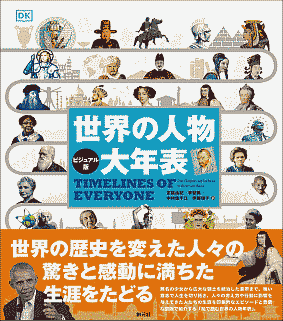
『世界の人物大年表(ビジュアル版)』をパラパラと眺めている.2020年に英語で出版された Timelines of Everone を翻訳したもので,めくっているだけで楽しい世界史の人物年表・事典である.
冒頭にほど近い pp. 10--11 に「人類の歴史」と題する見開きのインフォグラフィックがある.ここから小見出しのみを抜き出してみる.人類史上の15件の画期的な出来事が選び出されている.
| 250万年前ごろ | 最初の道具 |
| 80万年前ごろ | 火 |
| 40万年前ごろ | 槍で狩る |
| 4万4000年前ごろ | 洞窟壁画 |
| 4万年前ごろ | 世界中で(石器や衣服) |
| 2万年前ごろ | 陶器 |
| 1万5000年前ごろ | 寒さをしのぐ住居 |
| 1万4000年前ごろ | 犬とヒト |
| 1万2000年前ごろ | 農業 |
| 9000年前ごろ | 金属の利用 |
| 8009年前ごろ | 都市生活 |
| 紀元前3400年前ごろ | 文字 |
| 1500年ごろ | 大洋横断 |
| 1750年ごろ | 新技術 |
| 1990年ごろ | コンピュータ時代 |
ここでは著者らによる人類史上ベスト15が掲げられているわけだが,ベスト15のリストは,歴史家の数だけ候補があるはずだ.もし私が作ったら,言語贔屓なだけに,言語史上の出来事が多く挙がってくるのだろうな,などと妄想した.上記の一覧では,紀元前3400年前ごろの文字(の発明)が言語周りの出来事としてエントリーされている.
・ 定延 由紀・李 聖美・中村 左千江・伊藤 理子(訳)『世界の人物大年表(ビジュアル版)』 創元社,2022年.
[ 固定リンク | 印刷用ページ ]
2024-12-09 Mon
■ #5705. 英語に関する素朴な疑問 千本ノック at 目白大学 [senbonknock][sobokunagimon][sociolingustics][voicy][heldio][goshosan][stress][personal_pronoun][pragmatics][variety][3ps][language_or_dialect][language_family][origin_of_language][artificial_language][waseieigo][stigma][synonym][sapir-whorf_hypothesis][lexicology]
先日,五所万実さん(目白大学)に,同大学で開講されている社会言語学入門の授業にお招きいただきました.ありがとうございます! 事前に受講学生の皆さんより質問を募るなどの準備を整えた上で,授業本番で千本ノック (senbonknock) を敢行しました.五所さんと2人でのライヴのような千本ノックとなりましたが,数々の良問が飛び出し,80分ほどのエキサイティングなセッションとなりました.
この授業の一部始終を Voicy heldio で収録しました.全体を前半と後半に分け,各々を配信しました.以下に各質問および対応するチャプター分秒を示します.
【前半(約48分) 「#1284. 英語に関する素朴な疑問 千本ノック at 目白大学 --- Part 1」】
(1) Chapter 2, 03:55 --- 発音上のアクセントが苦手なのですが,何かコツはありますか? (言語におけるアクセントの存在意義は?)
(2) Chapter 3, 04:58 --- なぜ日本語には「私」「僕」「俺」など1人称に多くの言い方があるのですか?
(3) Chapter 4, 00:03 --- 日本語にあるような役割語は英語には存在するのですか? (「周辺部」の話題へ)
(4) Chapter 4, 04:40 --- なぜ you には「あなた」と「あなた方」の両方の意味があるのですか?
(5) Chapter 5, 02:57 --- なぜ3単現の -s をつけるのですか?
(6) Chapter 5, 01:26 --- 違う語族なのに似ている言語はありますか? (言語と方言の区別,世界の言語の数の問題へ)
【後半(約35分) 「#1287. 目白大学で千本ノック with 五所先生 (2)」】
(7) Chapter 2, 00:05 --- 人類で初めて2つの言語を習得した人間は誰ですか?
(8) Chapter 2, 02:57 --- 世界の共通語を作ることは実現可能ですか?
(9) Chapter 3, 03:35 --- 最初に英語が日本に入ってきたとき,どのように翻訳できたのですか?
(10) Chapter 3, 02:51 --- 和製英語のようなものは他言語にもあるのですか?
(11) Chapter 4, 00:46 --- 日本語のバイト敬語のようなものは英語にもありますか?
(12) Chapter 5, 00:00 --- なぜ英語には say, speak, tell など「言う」を意味する単語が多いのですか?
授業というよりも,五所さんとの heldio 生配信イベントとなりました.ありがとうございました.
2024-12-08 Sun
■ #5704. 朝カルシリーズ講座の第8回「英語,オランダ語と交流する」をマインドマップ化してみました [asacul][oe][dutch][mindmap][notice][kdee][etymology][hel_education][lexicology][vocabulary][heldio][link]
11月30日に,今年度の朝日カルチャーセンター新宿教室でのシリーズ講座の第8回が開講されました.今回は「英語,オランダ語と交流する」と題して,英語史ではあまり注目されることのないオランダ語との言語接触について論じました.企画時には90分の講義に値するテーマかどうか自問していましたが,資料を準備する段になって,それが杞憂であることがわかりました.対面およびオンラインで,多くの方々にご参加いただき,ありがとうございました.
講座の内容を,markmap というウェブツールによりマインドマップ化して整理してみました(画像としてはこちらからどうぞ).受講された方は復習用に,そうでない方は講座内容を垣間見る機会としてご活用ください.
今回のシリーズ第8回については hellog と heldio の過去回でも取り上げていますので,ご参照ください.
・ hellog 「#5689. 11月30日(土)の朝カルのシリーズ講座第8回「英語,オランダ語と交流する」のご案内」 ([2024-11-23-1])
・ heldio 「#1277. 11月30日(土)の朝カル講座「英語,オランダ語と交流する」に向けて」 (2024/11/27)
また,シリーズ過去回のマインドマップについては,以下もご参照ください.
・ 「#5625. 朝カルシリーズ講座の第1回「英語語源辞典を楽しむ」をマインドマップ化してみました」 ([2024-09-20-1])
・ 「#5629. 朝カルシリーズ講座の第2回「英語語彙の歴史を概観する」をマインドマップ化してみました」 ([2024-09-24-1])
・ 「#5631. 朝カルシリーズ講座の第3回「英単語と「グリムの法則」」をマインドマップ化してみました」 ([2024-09-26-1])
・ 「#5639. 朝カルシリーズ講座の第4回「現代の英語に残る古英語の痕跡」をマインドマップ化してみました」 ([2024-10-04-1])
・ 「#5646. 朝カルシリーズ講座の第5回「英語,ラテン語と出会う」をマインドマップ化してみました」 ([2024-10-11-1])
・ 「#5650. 朝カルシリーズ講座の第6回「英語,ヴァイキングの言語と交わる」をマインドマップ化してみました」 ([2024-10-15-1])
・ 「#5669. 朝カルシリーズ講座の第7回「英語,フランス語に侵される」をマインドマップ化してみました」 ([2024-11-03-1])
次回の朝カル講座は.12月21日(土)17:30--19:00に開講予定です.第9回「英語,ラテン・ギリシア語に憧れる」と題して,主に初期近代英語期の古典語からの語彙借用に注目します.ご関心のある方は,朝日カルチャーセンター新宿教室の「語源辞典でたどる英語史」のページよりお申し込みください.
・ 寺澤 芳雄(編集主幹) 『英語語源辞典』新装版 研究社,2024年.
2024-12-07 Sat
■ #5703. 通言語的にみる名詞カテゴリー [noun][category][gender][classifier][typology]
多くの言語で,名詞にまつわる文法カテゴリー (category) が存在する.どの言語でも名詞の数は多いものだが,それを何らかの基準で分類するということが,通言語学的に広く観察される.印欧諸語では文法性 (gender) が典型的な名詞カテゴリーであり,日本語では助数詞が例となる.
世界の言語の名詞カテゴリーを論じた類型論の著書として Genders and Classifiers: A Cross-Linguistic Typology がある.Aikhenvald (1) は,その冒頭で名詞カテゴリーを次のように導入している.
A noun may refer to a man, a woman, an animal, or an inanimate object of varied shape, size, and function, or have abstract reference. Noun categorization devices vary in their expression, and the contexts in which they occur. Large sets of numeral classifiers in South-East Asian languages occur with number words and quantifying expressions. Small highly grammaticalized noun classes and gender systems in Indo-European and African languages, and the languages of the Americas are expressed with agreement markers on adjectives, demonstratives, and also on the noun itself. Further means include noun classifiers, classifiers in possessive constructions, verbal classifiers, and two lesser-known types: locative and deictic classifiers.
All noun categorization devices are based on the universal semantic parameters of humanness, animacy, sex, shape, form, consistency, orientation in space, and function. They may reflect the value of the object, and the speaker's attitude to it. Their meanings mirror socio-cultural parameters and beliefs, and may change if the society changes. Noun categorization devices offer a window into how speakers conceptualize the world they live in.
このように述べた上で,Aikhenvald (2--6) は,類型論の観点から,7種類の名詞カテゴリー化の手段を挙げている.
I. Gender systems
II. Numeral classifiers
III. Noun classifiers
IV. Possessive classifiers
V. Verbal classifiers
VI. Locative classifiers
VII. Deictic classifiers
印欧祖語の文法性が I に,日本語の助数詞が II に属することになる.
・ Aikhenvald, Alexandra Y. "Noun Categorization Devices: A Cross-Linguistic Perspective." Chapter 1 of Genders and Classifiers: A Cross-Linguistic Typology. Ed. Alexandra Y. Aikhenvald and Elena I. Mihas. Oxford: OUP, 2019.
2024-12-06 Fri
■ #5702. 古英語単語の意味変化 [oe][semantic_change][christianity][latin][metaphor][semantic_borrowing][contact]
いずれの言語においても,語彙の意味変化 (semantic_change) はきわめてありふれたタイプの言語変化であり,常に起こっている.このことは「#1955. 意味変化の一般的傾向と日常性」 ([2014-09-03-1]) でも論じた通りである.古英語の単語にも,多くの意味変化が起こっていたことだろう.
しかし,たくさんあったであろう古英語単語の意味変化を,文献学的に文証できるかどうかは別問題である.そもそも古英語の現存する資料は少ないため,ある単語の意味変化が古英語期中に起こったのかどうかを確かめるのに十分な情報が得られないことも多い.また,意味変化が確かに起こったと言えるためには,変化前と変化後の語義の各々の出典となるテキストが,時間的に前後していることを確言できなければならない.しかし,これにはテキスト年代や写本年代をめぐる諸問題がつきまとう.
このような事情で古英語期の単語の意味変化を論じるには困難が生じるのだが,それでもある程度言えることはある.アングロサクソン事典の "semantic change" の項目 (p. 415) より関連する箇所を引用する.
One area of vocabulary in which semantic change clearly took place during the Old English period is religious terminology. God 'God', heofon 'heaven', and helle 'hell', for example, necessarily adopted new meanings when they were applied to Christian rather than pagan concepts. Semantic change can also take the form of the development of a metaphorical meaning. In Old English this sometimes took place under the influence of Latin. Examples include tunge 'tongue', which was extended to mean 'language', possibly modelled on Latin lingua, and wit(e)ga 'wise man', used for 'prophet', perhaps influenced by Latin propheta. After the establishment of the Danelaw, OE terms also underwent semantic development under the influence of their Old Norse cognates. Modern English bloom 'flower' takes its form from either Old English bloma 'ingot of iron' or Old Norse blom 'flower', but its sense is clearly from Old Norse. In Old English, plog (ModE plough) was used for the measure of land which a yoke of oxen could plough in a day; its use with reference to an agricultural implement developed under the influence of Old Norse plogr. Similarly, Old English eorl 'man, warrior' (ModE earl) developed the sense 'chief, ruler of a shire' under the influence of Old Norse jarl.
ラテン語のキリスト教用語の影響による意味変化や古ノルド語の対応語の影響による意味変化が取り上げられているが,これは歴史言語学では意味借用 (semantic_borrowing) として言及されることの多いタイプのものである.他言語における当該の単語の意味が分かっており,かつ言語接触の時期などが特定できれば,このような意味変化の議論も可能になるということだ.歴史言語学や文献学の方法論上のトピックとしてもおもしろい.
・ Lapidge, Michael, John Blair, Simon Keynes, and Donald Scragg, eds. The Blackwell Encyclopaedia of Anglo-Saxon England. Malden, MA: Blackwell, 1999.
2024-12-05 Thu
■ #5701. 南アフリカ英語を特徴づける語彙 [south_africa][variety][afrikaans][lexicology][borrowing]
南アフリカで話される英語 "South African English" をめぐる事情は,歴史が込み入っており,関与する言語・変種も多様で一筋縄では行かない.本ブログでは「#343. 南アフリカ共和国の英語使用」 ([2010-04-05-1]) をはじめとして,south_africa の記事群で取り上げてきた.
今回は,南アフリカ英語に端を発し,同変種を特徴づける語彙を紹介したい.3点の文献を参照し,南アフリカ英語らしい単語を,重複しない2つのリストで提示する.
【 Baugh and Cable (312--13) より 】
aardvark(ツチブタ),apartheid(人種隔離制度,アパルトヘイト),veld(t)(広々とした草原),commandeer(徴兵する),commando(市民騎馬軍団),trek(牛車で旅をする),biltong(塩味の切り干し肉),braaivleis(バーベキューパーティ),donga(峡谷),gogga(昆虫),koeksisters(ひねりドーナツ),kopje(小丘),mealies(トウモロコシ),ou(やつ,男),spruit(小川),stoep(ベランダ),veldskoen(革靴)
【 Crystal (English, 40) および Crystal (Encyclopedio, 377) より 】
advocate (法廷弁護士),bad friends (話し合うほどではない仲の者たち),bakkie (軽トラック),bell (電話する),bioscope (映画),boer (ボーア人),bottle store (酒屋),butchery (肉屋),camp (牧草地),dinges (何とかいうもの),dorp (村),eland (イランダ),fundi (専門家),gnu (ヌー),homeland (ホームランド;アパルトヘイト政策によって設けられた黒人住民のための自治区),impala (インパラ),indaba (会議),indri (インドリ),kloof (峡谷),kraal (村落;小屋),lekker (良い),mamba (マムバ),putu (パン状のかゆ),rand (ランド;南アフリカ共和国の通貨),robot (信号機),shebeen (もぐりの黒人酒場),spoor (わだち),springbok (スプリングボック),arvey (午後;= afternoon),tse-tse (ツェツェバエ),verkrampte (超保守主義者;極めて頑迷な),voorskot (前貸し金)
なお,南アフリカ英語の語彙については,同変種版の OED というべき A Dictionary of South African English on Historical Principles (OUP, 1996) が詳しい典拠となる.
・ Baugh, Albert C. and Thomas Cable. A History of the English Language. 6th ed. London: Routledge, 2013.
・ Crystal, David. The English Language. 2nd ed. London: Penguin, 2002.
・ Crystal, David. The Cambridge Encyclopedia of the English Language. Cambridge: CUP, 1995. 2nd ed. 2003.
2024-12-04 Wed
■ #5700. ウェブ月刊誌 Helvillian の創刊号・第2号が公開されています [helwa][heldio][notice][helmate][helkatsu][helvillian][helville][hellive2024]
9月8日(日)に khelf(慶應英語史フォーラム)の主催で heldio の12時間生配信企画「英語史ライヴ2024」が実施されました.ヘルメイト(= helwa リスナー)の方々が全国各地より東京の会場に参集し,当日のライヴに参加されたわけですが,このイベント後,ヘルメイトの「hel活」(英語史活動;helkatsu)がたいへんな勢いで盛り上がってきました.
その1つの現われが,今回ご紹介する『月刊 Helvillian 〜ハロー!英語史』です.有志ヘルメイトによる制作で,note 上に公開されています.毎月28日発行です.これまでに創刊号(2024年10月28日)と第2号(2024年11月28日)が公開されています.ぜひこちらの note アカウントをフォローしていただければと思います.


Helvillian は,毎月ヘルメイトが作成した英語史系ウェブコンテンツを集積し,リンク集を作って公開するウェブマガジンです.さらに特集も組まれており,最新号第2号では,制作班がアンケートを実施した上で「ヘルメイトってどんな人」の記事を執筆されています.その他,こだわりをもって制作された表紙やロゴ,編集後記なども見所です.
「英語史をお茶の間に」をモットーに掲げている私としては,このような素晴らしい形で有志のhel活を推進されている編集委員の Grace さん,Lilimi さん,MISATO (Galois) さん,umisio さんに改めて感謝いたします.
創刊号・第2号の各々については「英語の語源が身につくラジオ (heldio)」にて以下の配信回でもご案内していますので,ぜひお聴きください.これからも強力に応援していきたいと思います!
・ heldio 「#1282. 月刊 Helvillian 第2号が公開されました --- ヘルメイトさんによる自主的なhel活」(2024年10月29日配信)
・ helwa 「【英語史の輪 #204】祝・Helvillian 創刊」(2024年10月29日配信)
・ heldio 「#1248. 月刊誌 Helvillian 創刊! --- helwa リスナー有志によるウェブマガジン」(2024年12月3日配信)
2024-12-03 Tue
■ #5699. 20世紀初頭には消えかかっていた royal we [register][royal_we][monarch][lmode][dutch][personal_pronoun][pronoun][register]
Poutsma (878) に,1人称複数代名詞の特別な用法として royal_we の話題が取り上げられている.ただし,術語としては "Plural of Majesty or Plural of Dignity" が用いられている.
As in Dutch, the plural of the first person is sometimes used by sovereigns, especially in public utterances, when speaking of themselves.
About this Plural of Majesty or Plural of Dignity, as it is commonly called, Sweet (N. E. Gr., §2095) observes: "We see the beginnings of this usage in Old-English laws, where the king speaks of himself as iċ, and then goes on to say wē bebēodath .. 'we command ..', the wē being meant to include the witan or councillors." Compare also Kellner, Hist. Outl. of Eng. Synt., §276; Onions, Advanced Eng. Synt., §221.
We were not born to sue, but to command. Rich. II, ii, 1, 196.
Fair and noble hostess, | We are your guest to-night. Macb., I, 6, 24.
Should our host murder us on this spot --- us, his king and his kinsman, ...our fate will be little lightened, but, on the contrary greatly aggravatated, by your stirring, Scott, Quent. Durw., Ch. XXVII, 354.
The Queen said ...: "We are this day fortunate --- we enjoy the company of our amiable hostess at an unusual hour. Id., Abbot, Ch. XXI, 225.
Note. This practice seems to have become unusual or extinct in the personal utterances of sovereigns to their audiences, having been preserved only in public instruments.
Thus King George V in his reply to the address of the Corporation of Bombay uses I, etc.:
You have rightly said that I am no stranger among you [etc.]. Times, No. 1823, 974b.
Similarly in his Address on the occasion of the opening of the Coronation Durbar:
It is with genuine feelings of thankfulness and satisfaction that I stand here to-day among you [etc.]. Id., No. 1824, 1001d.
But in the instrument announcing the fact that the seat of the Government of India will be transferred from Calcutta to Delhi, we find we, etc.: We are pleased to announce to Our People [etc.]. Ib.
20世紀初頭までに royal we は事実上消えていたことが確認できる.使われることがあるにせよ,公的法律文書における伝統的な用法としてであり,レジスターはきわめて限定されていたことがわかる.
・ Poutsma, H. A Grammar of Late Modern English. Part II, The Parts of Speech, 1B. Groningen: P. Noordhoff, 1916.
2024-12-02 Mon
■ #5698. royal we の起源と古英語・中英語 [greek][latin][royal_we][monarch][sociolinguistics][oe][me]
昨日の記事「#5697. royal we は「君主の we」ではなく「社会的不平等の複数形」?」 ([2024-12-01-1]) に引き続き「君主の we」 (royal_we) に注目する.術語としては "plural of majesty", "plural of inequality" なども用いられているが,いずれも1人称複数代名詞の同じ用法を指している.
Mustanoja (124) は,"plural of majesty" という用語を使いながら,ラテン語どころかギリシア語にまでさかのぼる用例の起源を示唆している.その上で,英語史における古い典型例として,中英語より「ヘンリー3世の宣言」での用例に言及していることに注目したい.
PLURAL OF MAJESTY. --- Another variety of the sociative plural (pluralis societatis) exists as the plural of majesty (pluralis majestatis), likewise characterised by the use of the pronoun of the first person plural for the first person singular. The plural of majesty originates in a living sovereign's habit of thinking of himself as an embodiment of the whole community. As the use of the plural becomes a mere convention, the original significance of this plurality tends to disappear. The plural of majesty is found in the imperial decrees of the later Roman Empire and in the letters of the early Roman bishops, but it can be traced to even earlier times, to Greek syntactical usage (cf. H. Zilliacus, Selbstgefühl und Servilität: Studien zum unregelmâssigen Numerusgebrauch im Griechischen, SSF-GHL XVIII, 3, Helsinki 1953). The plural of majesty is extensively used in medieval Latin. In OE it does not seem to be attested. OE royal charters, for example, have the singular (ic Offa þurh Cristes gyfe Myrcena kining; ic Æþelbald cincg, etc.). The plural of majesty begins to be used in ME. A typical ME example is the following quotation from the English proclamation of Henry III (18 Oct., 1258), a characteristic beginning of a royal charter: --- Henry, thurȝ Gode fultume king of Engleneloande, Lhoaverd on Yrloande, Duk on Normandi, on Aquitaine, and Eorl on Anjow, send igretinge to alle hise holde, ilærde ond ileawede, on Huntendoneschire: thæt witen ȝe alle þæt we willen and unnen þæt . . ..
引用中の "the English proclamation of Henry III (18 Oct., 1258)" (「ヘンリー3世の宣言」)での用例について,ナルホドと思いはする.しかし「#5696. royal we の古英語からの例?」 ([2024-11-30-1]) の最後の方で触れたように,この例ですら確実な royal we の用法かどうかは怪しいのである.この宣言の原文については「#2561. The Proclamation of Henry III」 ([2016-05-01-1]) を参照.
・ Mustanoja, T. F. A Middle English Syntax. Helsinki: Société Néophilologique, 1960.
2024-12-01 Sun
■ #5697. royal we は「君主の we」ではなく「社会的不平等の複数形」? [terminology][oe][me][royal_we][monarch][personal_pronoun][pronoun][sociolinguistics][politeness][t/v_distinction][honorific][number][shakespeare]
数日間,「君主の we」 (royal_we) 周辺の問題について調べている.Jespersen に当たってみると「君主の we」ならぬ「社会的不平等の複数形」 ("the plural of social inequality") という用語が挙げられていた.2人称代名詞における,いわゆる "T/V distinction" (t/v_distinction) と関連づけて we を議論する際には,確かに便利な用語かもしれない.
4.13. Third, we have what might be called the plural of social inequality, by which one person either speaks of himself or addresses another person in the plural. We thus have in the first person the 'plural of majesty', by which kings and similarly exalted persons say we instead of I. The verbal form used with this we is the plural, but in the 'emphatic' pronoun with self a distinction is made between the normal plural ourselves and the half-singular ourself. Thus frequently in Sh, e.g. Hml I. 2.122 Be as our selfe in Denmarke | Mcb III. 1.46 We will keepe our selfe till supper time alone. (In R2 III. 2.127, where modern editions have ourselves, the folio has our selfe; but in R2 I. 1,16, F1 has our selues). Outside the plural of majesty, Sh has twice our selfe (Meas. II. 2.126, LL IV. 3.314) 'in general maxims' (Sh-lex.).
. . . .
In the second person the plural of social inequality becomes a plural of politeness or deference: ye, you instead of thou, thee; this has now become universal without regard to social position . . . .
The use of us instead of me in Scotland and Ireland (Murray D 188, Joyce Ir 81) and also in familiar speech elsewhere may have some connexion with the plural of social inequality, though its origin is not clear to me.
ベストな用語ではないかもしれないが,社会的不平等における「上」の方を指すのに「敬複数」 ("polite plural") などの術語はいかがだろうか.あるいは,これではやや綺麗すぎるかもしれないので,もっと身も蓋もなく「上位複数」など? いや,一回りして,もっとも身も蓋もない術語として「君主複数」でよいのかもしれない.
・ Jespersen, Otto. A Modern English Grammar on Historical Principles. Part 2. Vol. 1. 2nd ed. Heidelberg: C. Winter's Universitätsbuchhandlung, 1922.
2026 : 01 02 03 04 05 06 07 08 09 10 11 12
2025 : 01 02 03 04 05 06 07 08 09 10 11 12
2024 : 01 02 03 04 05 06 07 08 09 10 11 12
2023 : 01 02 03 04 05 06 07 08 09 10 11 12
2022 : 01 02 03 04 05 06 07 08 09 10 11 12
2021 : 01 02 03 04 05 06 07 08 09 10 11 12
2020 : 01 02 03 04 05 06 07 08 09 10 11 12
2019 : 01 02 03 04 05 06 07 08 09 10 11 12
2018 : 01 02 03 04 05 06 07 08 09 10 11 12
2017 : 01 02 03 04 05 06 07 08 09 10 11 12
2016 : 01 02 03 04 05 06 07 08 09 10 11 12
2015 : 01 02 03 04 05 06 07 08 09 10 11 12
2014 : 01 02 03 04 05 06 07 08 09 10 11 12
2013 : 01 02 03 04 05 06 07 08 09 10 11 12
2012 : 01 02 03 04 05 06 07 08 09 10 11 12
2011 : 01 02 03 04 05 06 07 08 09 10 11 12
2010 : 01 02 03 04 05 06 07 08 09 10 11 12
2009 : 01 02 03 04 05 06 07 08 09 10 11 12
最終更新時間: 2026-01-27 10:29
Powered by WinChalow1.0rc4 based on chalow